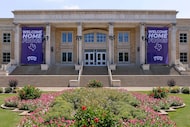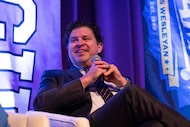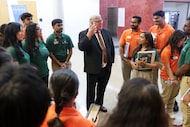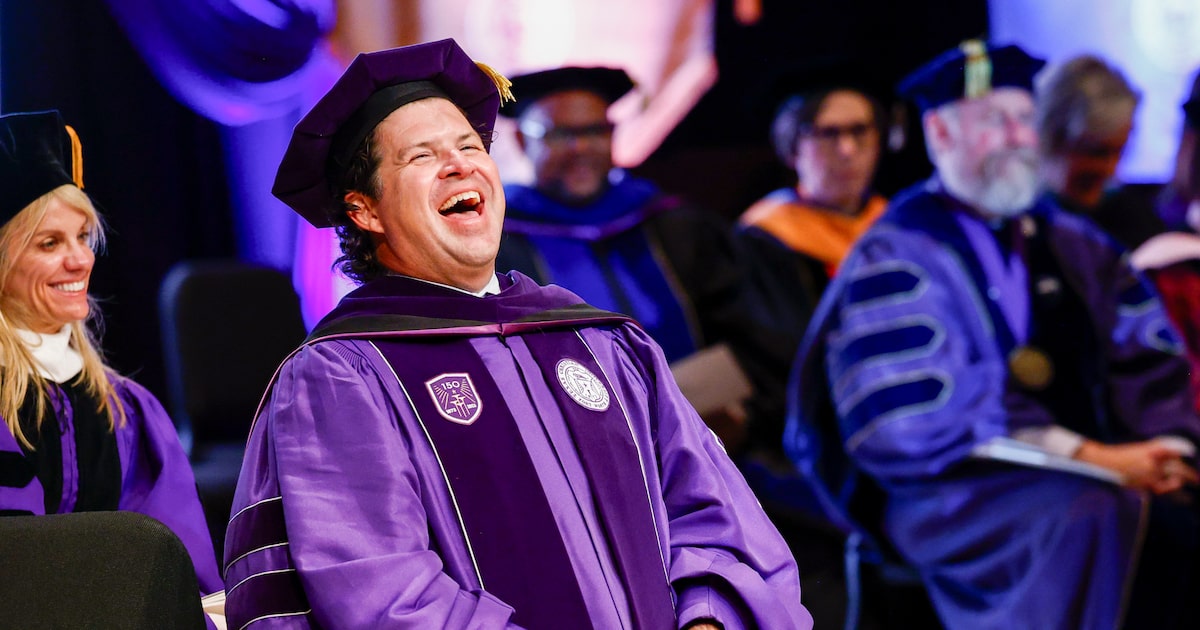Texas Christian University officially handed the reins to Daniel Pullin on Thursday, inaugurating him as the school’s 11th chancellor.
“Today, and tomorrow, and tomorrow’s tomorrow, my job is to make sure your spirit endures at TCU,” Pullin said during his remarks. “Education is not only about what we know, but about who we become and what we do with it.”
In the Van Cliburn Concert Hall, the chancellor’s medallion was gingerly placed around Pullin’s neck. The audience erupted in applause, with some documenting the moment on their phones.
In the lobby, tables draped in purple cloth showcased congratulatory letters from universities across the country, including Harvard College, Texas Wesleyan University and Kansas State University.
The Education Lab
Pullin’s voice wavered with emotion when he spoke about his father’s selflessness and Pullin’s attachment to TCU. Four purple flags reading “Excellence, Community, Engagement and Integrity” hovered above him, and faculty members, donned in black and purple academic regalia, sat behind him.
The ceremony marked a transition for the university, as the 49-year-old Pullin set his vision into motion. That vision includes elevating TCU’s national standing in research and strengthening ties with Fort Worth.
The vision is outlined in the university’s strategic plan, called “LEAD ON: Values in Action,” which was approved by the Board of Trustees in November 2024. Pullin solicited input from more than 10,000 community members through surveys and meetings to inform the university blueprint.
Among those priorities, school leaders seek to position TCU among the country’s top universities. They want TCU to earn an R1 designation under the Carnegie classification methodology, meaning the institution spends $50 million or more on research and awards at least 70 research doctorates annually. It’s a sought-after title that can draw exclusive faculty.
Southern Methodist University , The University of Texas at Dallas, and Baylor University are considered R1. TCU is currently recognized as an R2 school, the second-highest tier.
In the coming decade, TCU will prioritize research in natural resources, health sciences, computing, artificial intelligence and engineering, Pullin said. TCU’s College of Science & Engineering received a $40 million philanthropic investment — the largest donation in the college’s 25-year history — to bolster research. It was renamed Louise Dilworth Davis College of Science & Engineering in honor of the donor, TCU announced Wednesday.
Related

“TCU has the opportunity to lead the way on everything below the ground, the ground itself, everything that drops on the ground, and everything above the ground,” Pullin said in an interview. “We’re working every day to enhance TCU’s role as an institution of innovation.”
Amid rising competition for workers, Fort Worth leaders have underscored the need to keep Texas talent local.
North Texas’ population is set to skyrocket over the next 10 years — and residents’ educational attainment needs to be in step with that growth, leaders said at a panel ahead of the inauguration. It’s a sentiment Pullin echoed in his inauguration address.
“How fortunate I have been to live in Fort Worth, where so many people have poured into me during my time at TCU,” he said. “It’s their investment that motivates me, in turn, to similarly invest in people here.”
Related

Pullin began his tenure as chancellor in June and previously served as TCU’s president for about two years. He arrived at TCU in 2019 as the John V. Roach Dean of the Neeley School of Business. Before TCU, he held higher administration posts at the University of Oklahoma, according to Pullin’s biography page.
TCU is looking to support the health care industry, which is one of the biggest contributors to the region’s economy. As the population booms, the number of health care workers could struggle to keep up. The university wants to be “a stronger part of that solution,” Pullin said.
“As we grow, [we want] to be a bigger part of not only the discoveries that are going to improve patient care, but a bigger part of the workforce solutions that are necessary,” Pullin said.
TCU wants to “work backwards from the marketplace” to ensure students learn the necessary skills for the workforce — on top of a classic liberal arts education, Pullin said.
“Given the incredible marketplace in which we sit in D-FW, we have an opportunity to operate an institution of higher education at the intersection of academics and a vibrant community, economically, socially and otherwise,” Pullin said ahead of the inauguration.
Related

The university aims to boost enrollment to 14,900 undergraduate and 3,000 graduate students in the next 10 years, according to its strategic plan. Currently, there are about 11,100 undergraduate and 1,800 graduate students, according to TCU’s website.
TCU has made strides toward that mission by amping up its financial support to students. A year’s tuition is currently about $82,000, including room and board, according to TCU’s website. The school announced in August that Texans whose families make $70,000 or less each year will receive free tuition.
“This program will allow us to get back to something closer to parity, where we’re serving the broader needs of all of our capable students,” Pullin said in an interview.
At a school that has ranked at the top for “happiest students,” school leadership is directing more resources to upgrading the student experience. At least half of students will go abroad during their time at TCU, according to the strategic plan.
The document set goals to increase paid attendance at games and for its athletes to compete at the highest levels. Already, the university has set forth plans to revamp the campus to be more walkable and facelift buildings.
In his speech, Pullin spoke about the immense potential he sees in the TCU student body. Though the world “often feels divided, uncertain and terribly fast-moving” he called upon TCU to “move forward into the future with courage.”
“Together, we are building the university of the future — one that is innovative and highly connected to the world it serves,” Pullin said.
The DMN Education Lab deepens the coverage and conversation about urgent education issues critical to the future of North Texas.
The DMN Education Lab is a community-funded journalism initiative, with support from Bobby and Lottye Lyle, Communities Foundation of Texas, The Dallas Foundation, Dallas Regional Chamber, Deedie Rose, Garrett and Cecilia Boone, Judy and Jim Gibbs, The Meadows Foundation, The Murrell Foundation, Ron and Phyllis Steinhart, Solutions Journalism Network, Southern Methodist University, Sydney Smith Hicks, and the University of Texas at Dallas. The Dallas Morning News retains full editorial control of the Education Lab’s journalism.
